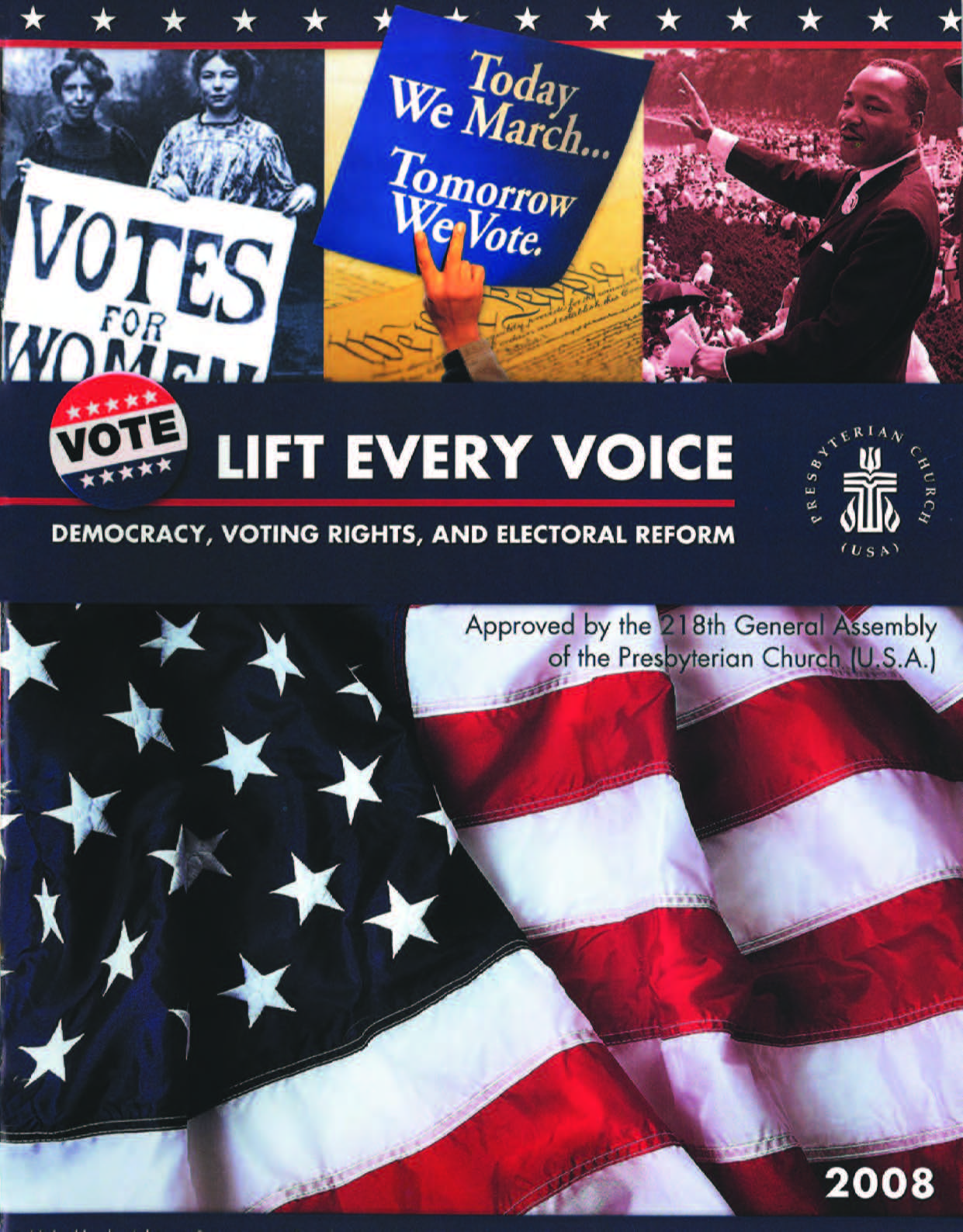I was sitting in the chapel last Wednesday between two women and we got to the hymn “For Everyone Born,” which somehow finds “justice and joy” in a verse where “abuser, abused, with need to forgive” have “a place at the table” (in Glory to God #769). One woman walked out as the hymn started, the other whispered to me she disliked that line. Neither of us sang it. I am not an expert in what triggers trauma, but I know that having abusers in churches is usually toxic to faith. This editorial is about whether pastoring in a “purple” church means blurring the difference between opposites as that verse does. I believe the impeachment trial of Donald Trump presents a virtually unavoidable choice for pastors with a sense of public responsibility, and I recommend holding special congregational forums to discuss its ramifications—some of which I try to address below.
First, in opposing that hymn verse, am I a liturgical snowflake wanting to “cancel” some incorrect or even deplorable element in my woke worship? I hope not; I confess to complete deplorability and love some pretty stern hymns and hard texts. That hymn, in fact, despite its good intentions and tune, makes me worry a bit about the sunny reconciliation of liberal fantasy, where justice comes without much struggle or sacrifice. That line seems not the prophetic vision of lion and lamb lying down on God’s holy mountain, but the acceptance of anything and anybody at a communion table that trades holiness for accessibility. Bonhoeffer has some pretty judgmental words about the kind of grace that offers.
By God’s good humor, the church I worshiped in on Sunday also featured the hymn, but with a totally re-written line naming more categories of inclusion. Thanks!
For more than a dozen years I served what is now called a “purple” church, and my pastoring probably lost the congregation a couple members over time, though we grew pretty steadily. (I say probably since few people join or leave churches for only one reason). Other folks more conservative (red) than me may have held back from joining till I left, or held back some of their feelings about the pastor out of loyalty to that congregation. Thank God, most members were smart and gracious enough to separate my chaff from the Gospel wheat.
Sometimes, of course, our more conservative members influenced me: when I first heard about his sex with an intern, I impulsively called for Clinton’s resignation. I then came to see that impeachment trial itself as a far worse exploitation of that young woman, and valued Clinton’s presidency overall. So no one is perfect and all are welcome at the table… except those who deny what the table is about. Without confession and sincere repentance, “we eat and drink damnation” to ourselves (as the King James of I Cor. 11: 29 reads).
Nadia Bolz-Weber’s punchy book, Pastrix, talks about the naming of her congregation, “the House of All Sinners and Saints,” reflecting the deeply Lutheran sense that we are all “simul justus et peccator,” righteous and sinful. Only at the more eschatological table—to which, in fairness, that hymn “For Everyone Born” points—will we share in the joy of justice fully present. But most mainline churches are not like Bolz-Weber’s. Many of our churches are in those suburbs that are increasingly trending a bit more liberal (blue), but are not trendy in any sense of the word. (Some also feel blue because they aren’t more multi-racial, but that’s another column).
The problem is not purple congregations, but purple pastoring. It is pulling punches out of a fear of polarized politics, trimming the Gospel to conform to current patterns of debate. As once- Republican political scientist, Norman Ornstein has shown, one party has moved steadily in the direction of extremism. For those pastors who always seek to split the difference, the center will keep moving them to larger and larger compromises. The advent of the most a-religious and amoral president in modern times only makes this harder, especially when his party leadership throws away every principle in order to cling to power. Mitch McConnell certainly doesn’t seem to care about legislation or the Constitution (see Merrick Garland); ideology serves transactionalism, and the basic transaction is campaign cash for media, plus voter suppression, equals electoral victory.
The problem is not purple congregations, but purple pastoring.
This cynicism about power is where trying not to take sides or to choose the middle becomes crazy-making. I read the sincere articles about purple church in the Outlook and the Century, the efforts to be inclusive of all viewpoints and values short of outright racism and hate speech. And I smell a confusion between pastoring and conflict avoidance. The prophetic component—which I tempered, too, sometimes—is a basic reason for a belief in “the freedom of the pulpit.” A key educational task of the Reformed tradition is to teach that God’s word is a two-edged sword, that it holds us all accountable, it always speaks to the common good and it always condemns idolatry—of every nation, race, class, gender, or orientation. The pastor’s first obligation is to God’s truth, which always has justice on its side and love in its heart.
The temptation for the pastor is to step out of or above politics, to judge it from the outside, as if we did not all have interests and some desire for power—for good, of course. Few of us are called to be judges, attempting neutrality and balancing consequences, and that is not what got Jesus crucified by the empire of his time. But doing justice requires political engagement and taking sides, without ever drinking the full “kool-ade” of partisan ideology. It means treating “abuser, abused” quite differently. Political alliances are provisional and imperfect, but also urgently needed, as when it comes to climate change, war, dictatorships, and public health. Part of the freedom of the pulpit is to fight for the church—big and small—to be a space of freedom and open debate. And that means extending the pulpit to witness in mass and social media where wise Christian voices are needed.
Addressing Trump’s impeachment may be best done, however, in a non-pulpit context. Invite articulate Christians to speak to an afternoon or evening program, and invite the high school students, too. Presbyterians have given serious thought to the Christian principles at stake. (See the section on Democracy)
The pragmatic reason not to be a purple pastor is that red pastors are killing Christianity in the minds of an increasing number of young people. Many so-called Evangelicals seem to have sold out for power. Consequently they are increasingly dragged into the corruption, hypocrisy, and dishonor of the president and his enablers. Unfortunately, due to the size of their echo-system, they bring the whole Gospel into disrepute. And on a larger level, the extreme inequality of our anti-regulatory capitalism means that there is less and less of an educated middle class for a middle class church to serve, and no way for many young people to afford a decent family life or good medical care: look at the birthrate and the steady pull of addictions.
Not all Evangelicals are corrupt, of course. I recently spoke with an independent church planter who had been unable to vote for either Hillary Clinton or Donald Trump. Personal morality is very important to him. But then he went on to claim global warming was a hoax, and that the scientific consensus was self-interested secular groupthink, though he did not deny there was a lot of pollution in the environment. I could not purple-up to him on that. His trust of media objectivity was too poisoned, perhaps too linked to the idea of science threatening faith.
Purple piety ultimately denies that politics is part of the Lord’s vineyard. It reduces matters of policy and power to personal and group feelings, mistakes optics for ethics, and caters to the church member as consumer who will move on if the preaching is not to her or his taste. Admittedly it is hard to challenge the livelihood of key donor families—say you are pastoring a hard-hit coal country congregation. It is even harder to be a trans-tribal Christian when the sports question of “whose team are you on?” reinforces partisanship. This where the work of a pastor and congregation is formation of people with a distinct and deep identity grounded in the Trinity, transcendent, immanent, and both. Last General Assembly’s resolution, Honest Patriotism, provides a grounding for Reformed citizenship in truth telling and other Christian values.
The Reformed tradition sees the vocation of political leadership as a high calling—the more people affected, the higher the potential crimes and misdemeanors. We cannot duck the responsibility to hold even the highest officials to account, which inevitably means applying principles to a particular person. As citizens in a representative democracy, we need to insist both houses of Congress follow the Constitution. Did the president obstruct justice and put his self-interest above the national interest? But this is not just for elected officials: the Trump impeachment trial will be a test of how each of us state our positions with integrity.
The implications of allowing any corrupt presidency to continue are considerable, as we see in countries around the world. We are in a commonwealth, and the nations of the world are all part of one human family, living in one “World House,” to use Martin Luther King, Jr.’s term. The Holy Spirit is—to quote Robert L. Moore—a BS detector, including of our own stuff. Thus for most pastors it may not be as hard as they fear to support impeachment—assuming the evidence continues to pile up overwhelmingly in one direction and the Mueller Report is not left out.
In the impeachment trial we will see some Republican lawmakers struggle to justify their defense of the president, as it will define their political survival. But it should be possible for most citizens and pastors to detach the president and his enablers—even a lot of them—from the other branches of government and from principled conservatism. If the trial brings into focus corruption across the board–in tax evasion, in weakened environmental protection, in predatory lending, in predatory health insurance…, then a growing number of people may understand impeachment to say: “enough!” It is larger than one person, but at the same time there cannot be healing without a cleansing of the toxins of lying, greed, and false equivalence that he has encouraged. James Comey’s pilgrimage may be helpful in this regard.
There is one more Reformed element that may be named, the role of councils to discern and deliberate. Just as Congress needs to reclaim its role as a deliberative body, so our churches are—in Lew Mudge’s terms—communities of moral discernment. Hence the suggestion of public conversations and forums. For pastors who know family systems, healthy self-differentiation can be tough, but it can lead to healthier systems overall. A strong and healthy pulpit should lead not to an enclosed and defensive system, but to a community of confident members with wide horizons framed by God’s reign.
To sum up, this is not a call for congregations to be one color, blue or red, but rather a call to pastors especially not to compromise on the content of their moral and theological discernment. None of us are all one color. As a wise friend phrases it, good pastoring in the purple or checkered church means finding ways to affirm the humanity of red and blue congregants and “find red and blue avenues to speak truth to them.” Of course, while I think impeaching and removing the president may well be our best hope for a less polarized politics and a more vital church voice, you may disagree.
More Resources:
Reformed Faith and Politics adopted by the 195th General Assembly of the Presbyterian Church USA
A Letter to Presbyterians Concerning the Present Situation in Our Country and in the World (1953)

Chris Iosso serves as Coordinator of the Advisory Committee on Social Witness Policy (ACSWP). In addition to his pastorate at the Scarborough (NY) Presbyterian Church, he has worked in the areas of human rights advocacy, corporate social responsibility, and ecumenical social teaching for the PCUSA, the United Church of Christ, and the National Council of Churches of Christ in the U.S.A. His BA is from Johns Hopkins University (in political science), his MDiv from Princeton Seminary, and his PhD from Union Seminary (NY).








Unbound Social